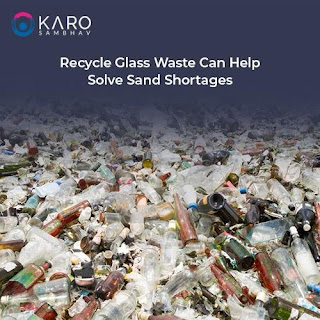Recycle Glass Waste can Help Solve Sand Shortages

Recently, there has been one element that is experiencing a dearth in production but also experiencing a rise in demand - construction sand. As a result, it is leading to the creation of a sustainable and affordable alternative that will eventually lead to circular economy. Moving ahead, glass waste is a byproduct of natural sand and can be a substitute for natural sand. Crushed glass waste might show geotechnical behaviour (properties) comparable to the latter. Utilising crushed waste glass by incorporating proper glass waste management as a substitute for traditional sand could lead to a double-duty benefit by directing the geo-environmental concerns of natural sand depletion and disposal of ever-increasing waste glass. The Sand Scarcity: An Imminent Danger We tend to take sand for granted but it's the cornerstone of the contemporary world. An essential building element, concrete, needs a lot of sand. Furthermore, sand is utilised in electronics and asphalt. Sadly, the am...

